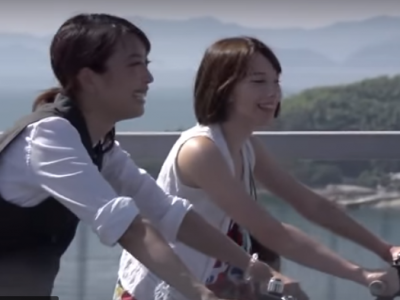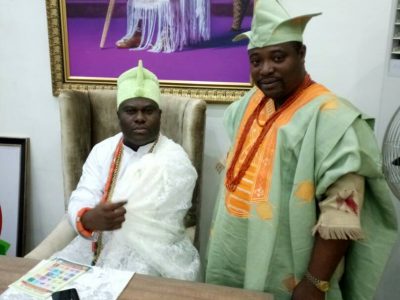ソマリ・フェイスは今年1月に発足したネット上の企画で、世界中に住む普通のソマリ人の物語を毎日配信している。発案者は物語作家兼人権活動家のドニア・ジャマル・アダムと、著述家兼歴史愛好家のモハメド・イブラヒム・シャイア、創造力ある2人組だ。2人ともアマチュア写真家でもある。
この企画の目的は大きく2つある。1つは世界に向けた、ソマリ人イメージの再構築である。彼らは元来、平和を愛し逆境に強い人々だ。そうしたイメージを取り戻すことによって、テロリストや海賊、軍閥や難民といった、彼らに対する固定観念を打破しようとしているのだ。2つ目は国内向けで、ソマリアの人々への愛情のこもったメッセージである。ちっぽけな氏族主義を超えて「同胞の仲間にはそれぞれの苦労や夢、後悔や志があることを、本気でわかり合おう」と。
ソマリ人が生きて語る力強い身の上話は、確かに喪失の物語だが、希望の物語でもある。ソマリ・フェイスのこうした物語は、世界中にいるソマリ人を訪問し交流することにより編纂されたものだ。彼らは皆、老いも若きも、語るに足る物語を持っている。
その中でも最も人をひきつける物語を、いくつかご紹介しよう。
教育者
I was born in Pakistan, raised in the United States and currently live in Hargeisa [Somaliland]. I moved to Hargeisa at the age of 10, after the tragic death of my mother (May God grant her Paradise). I come from two mostly uneducated, nomadic families. […] Being born to these two types of families […] gave me the eagerness to push myself and become successful and educated, be a successful story for my parents. Since my mother passed away, I always get judged strictly on a daily basis by the elders of our Somali community. […] So I arranged my goals into a strict order: news anchor, teacher, wife and a mother. […] I started anchoring news and programs for the English section of Radio Hargeisa at the age of 16. Then to make my father happy, I went on to study Public Health at a local university and found love in teaching. You never know when love knocks on your door. I never thought in a million years of getting married at a young age. Then I met my husband and realised he was the one for me. Alhamdullilah, we have been married for two years and I’m currently 19. We have a beautiful daughter and I’ve fulfilled the order I set out earlier and continue to act on it. My husband taught me to live by the well-known saying, ‘where there is a will, there is a way’. […] I created my own teaching course, teaching fellow Somalis how to learn English as a second language. I try to keep a smile on my face, no matter what I’m going through […] Amidst your rough upbringing, amidst your underprivileged background, the labels that people throw at you, remember you can make things still possible.
私はパキスタン生まれの米国育ちで、今はソマリランドのハルゲイサに住んでいます。ハルゲイサに越して来たのは10歳のときですが、母はその前に悲惨な死を迎えました(神が母を天に迎え入れてくださいますように)。父方も母方もあまり教育のない流浪民の家庭です。[中略]こうした2つの家庭に生まれたことで、[中略]何とか頑張って成功し教育を受けたい、立派になった姿を両親に見せたいと強く願うようになりました。母を亡くしたことで、私は日頃ソマリア地域社会の大人たちから厳しい目で見られています。[中略]そこで私は、自分に厳しい目標を課すことにしました。ニュースキャスター、それから教師、妻、母になることです。[中略]16歳のとき私はラジオ・ハルゲイサの英語部門で、ニュースや番組の総合司会を始めました。それから、父を喜ばせるため、公衆衛生を学ぼうとある地方大学に入り、教えることが大好きになりました。大好きになるきっかけって、わからないものですね。自分が若くして結婚するだなんて、まるっきり考えたこともなかったのです。でも夫と会ってすぐ、この人だとわかりました。神のお導きで結婚して2年経ち、私は今19歳です。かわいい娘もいて、前に決めた目標は達成したし、今も実現中です。有名な格言『成せば成る』という生き方を、夫は私に教えてくれました。[中略]独自の学習コースを作って、仲間のソマリ人に第二言語としての英語の学習法を教えています。どんなときでも笑顔を絶やさないよう努めています。[中略]生まれ育ちがどんなに悪くても、人からどんなレッテルを貼られても、やってできないことはないんですよ。
『盲目の女の子』
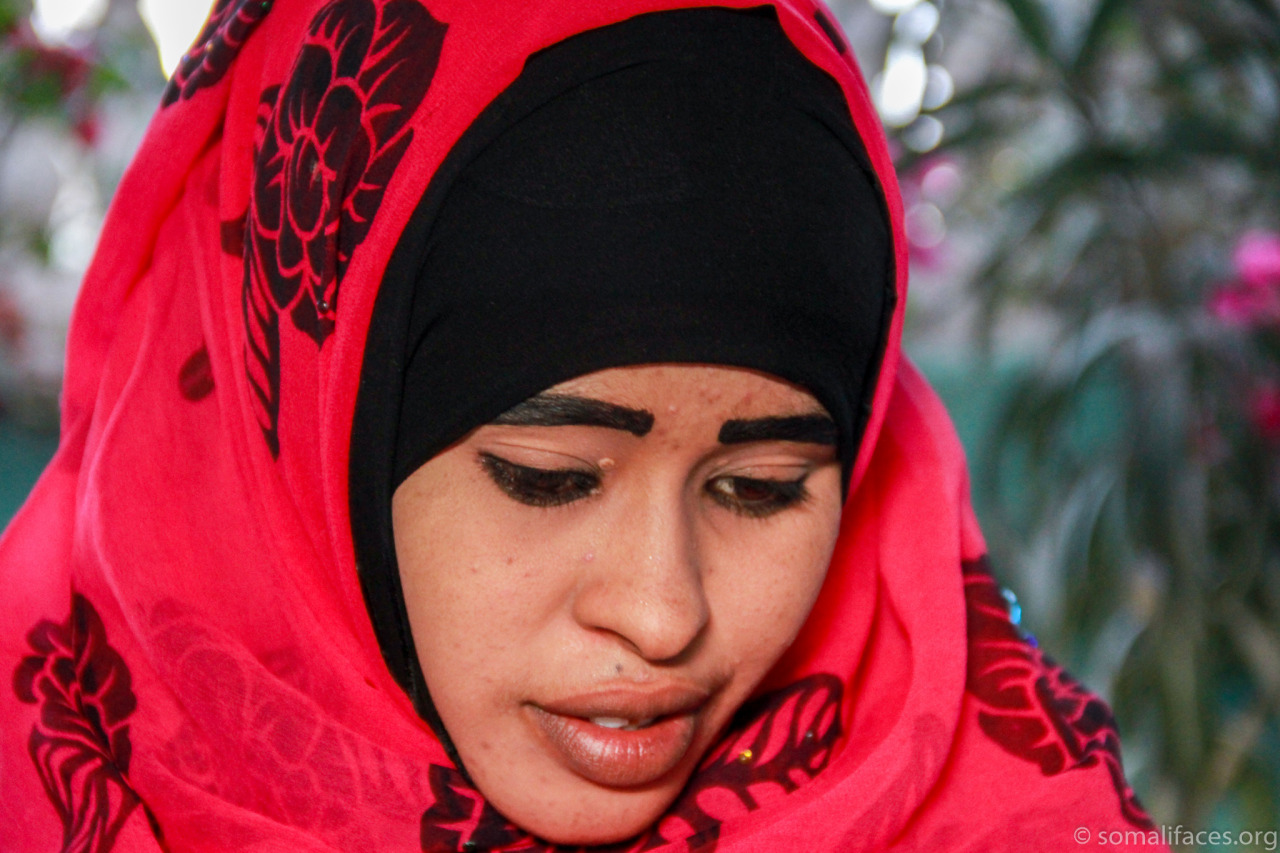
写真はソマリ・フェイス(ドニア&モハメド)より。使用許可済み。
My family and the Somali people that I interacted [with] didn’t know the proper way to raise or approach a blind girl. As a result, I became self-dependent and quite isolated. During my younger years, we lived in a village called Higlale, close to a large well. On a given morning, I accompanied my mother to collect some water […] my mother saw from afar two figures approaching the well […] You see, I love plants and flowers, though I’ve never seen how they look like, but I love caressing them, gently stroking them. So whilst we waited for them, I plucked lots of flowers, as many as my two hands could hold. When the two figures approached the well, they turned out to be a distant relative and her son. After greetings were exchanged, my aunt said […] ‘Who is this beautiful girl sitting next to you, is she yours?’ Before my mother could reply, she answered her own question: ‘Is she the blind girl?’ My mother replied in the affirmative. I got used to being referred to as the blind girl and I guess over the years, the hurt feeling dampened so it didn’t bother me much. But suddenly, once he heard that I’m blind, the son started walking towards me and sat next to me. He took the flowers that I held in my hands and patiently told me their names, their colours, where they can be found. I was taken aback for no one has ever done that for me. […]
He promised me that he will take me as many places as he possibly can, full of flowers and greenery. From that day onwards, he took me to the most beautiful places and we spent a lot of time together. I fell in love with him but since I was a young girl, I could not tell him. I kept thinking, in time I will disclose it to him. Unfortunately, we had to move […] In 2009, we saw [each other] once again in Hargeisa and I told myself that I’ve been given another chance to tell him so I did […] he replied with a question that bothered me to the core. He said: ‘How is possible for you to love, considering that you are blind and can’t see me?’ […] I tried to remain calm and explain to him that we, blind people, are capable of recognising love. In fact, you don’t need physical eyes to see and experience love. Love is experienced through the intuitive knowledge of our hearts and I see and recognise it with the eyes of my heart. […] In the end, however, we didn’t end up together and that’s God’s will. But know that beauty and love’s not experienced through your physical eyes. It’s experienced through your heart and I tell others who have been in my situation and are blind, if you experience love, don’t let your disability deter you from pursuing it. Everyone is capable of love.
私の家族も周囲のソマリ人も、盲目の女の子をどう育ててどう扱えばいいのか知りませんでした。その結果、私は自分で何でもやるようになり、かなり孤立していました。幼いころ住んでいたのはヒグレルという村で、大きな泉の近くでした。ある朝、私は母の水汲みについて行きました。[中略]母には、遠くから2人の人影が泉に向かって来るのが見えました。[中略]ほら、私は草花が大好きなもので、姿かたちは見えなくても、優しく触れてそっとなでるのが好きなんです。それで彼らを待つ間、花をたくさん、両手いっぱいに摘んでいました。2人が泉に近づくと、遠縁の女性とその息子だとわかりました。挨拶を交わした後、伯母さんは[中略]「このかわいい子は誰なの? あなたの娘?」母が返答する前に、彼女は自分で答えました。「あの盲目娘ね?」母は肯定しました。盲目娘呼ばわりされるのは慣れてましたし、今にして思えば傷つきやすさが鈍っていたのでしょう、私は何とも思いませんでした。ところが、私が盲目と聞いたその息子が、突然歩み寄って来て私の隣に座りました。彼は私の両手の花を取り、花の名前や色、よく咲いている場所について辛抱強く教えてくれました。これまで誰もそんなことをしてくれる人はいなかったので、私は面食らいました。
彼は私に、花や緑でいっぱいの場所にできるだけあちこち連れて行ってあげるよ、と約束しました。その日から彼はすごく美しい場所に連れて行ってくれ、長い時間一緒に過ごしました。私は彼に恋に落ちたのです。でも幼かったので、彼には言えませんでした。いつか告白しようと思い続けましたが、運悪く引っ越すことになりました。[中略]2009年に私たちはハルゲイサで再会しました。これは告白のチャンス、と自分に言い聞かせ、実行しました。[中略]彼は私に、本当に心ない質問を返しました。「君は盲目で僕が見えないのに、どうやって僕を好きになれるの?」と言ったのです。[中略]私はなんとか平静を保ち、彼に説明しようとしました。私たち目の見えない人だって、恋を認識できるんだと。実際、恋に出会って味わうとき、身体的な目は必要ありません。恋は私たちの心の直観的知識を通して味わうもので、私も心の眼で見て恋だとわかったのです。[中略]でも結局、彼との恋は実りませんでした。それは神のご意思です。でも頭に入れておいてほしい、美しさや恋愛は身体の目を通して味わうものじゃないんです。心で味わうものなんです。私のような状況の目の見えない人に言いたい、もし恋をしてるなら、障害を理由にあきらめてはダメ。誰にだって恋はできるんです。
移住者
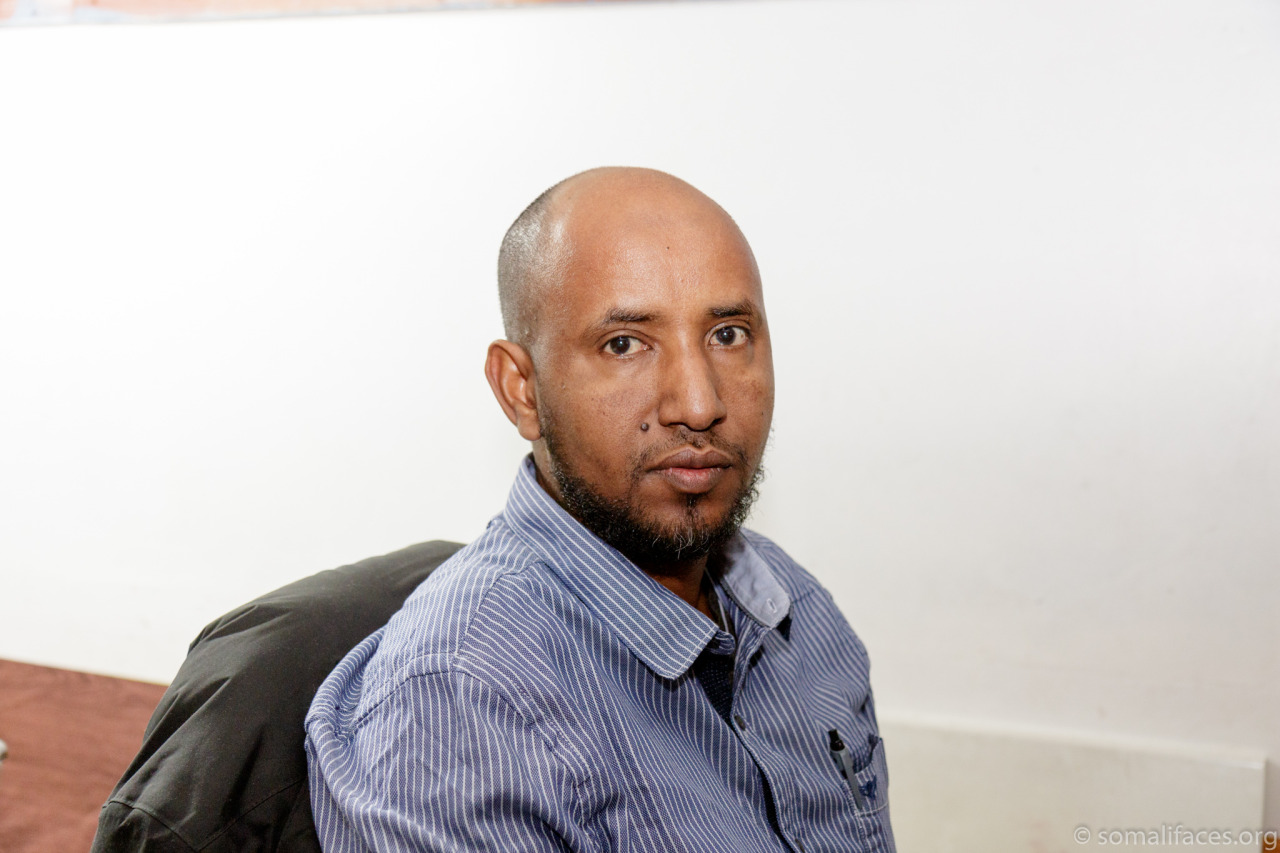
写真はソマリ・フェイス(ドニア&モハメド)より。使用許可済み。
Whilst in Mogadishu, a close friend of mine and I decided to enter Europe and travel through the usual path, which is from Ethiopia, Sudan, Libya and then into Europe. We ran out of money and were stranded in Ethiopia. […] I was broke, couldn’t speak Amharic and had little rent money left. With my last remaining money, I bought a Somali-English dictionary and grammar book. Every day, I would study at least 20 English words […] Within 2 months, I reached to a decent level where I could understand news programmes in English. I was getting stressed as the little money that I had left was running out but opportunity knocked […] You see, there was this Somali IT teacher who wanted to learn Arabic and I spoke fluent Arabic. […] He said he was willing to give 400 Ethiopian birr [Ethiopian currency] which was a lot […] my monthly rent was 50 birr. I thought about it and told him that I didn’t want his money. Just teach me computing and I will teach you Arabic. He happily agreed but told me that he couldn’t give me a certificate as I didn’t have a refugee card. I didn’t mind but of course, I was still not getting any money in. But thank God, by the next day, I met an American who wanted to learn Somali and we agreed that he would pay me 50 Ethiopian birr per half hour. After I taught him the Somali language, he tested it by travelling to the Ethiopian Somali region. A week later, he came back and started praising me profusely. Given that I had computing skills and spoke decent English, he offered me a good job at his place. […] Money comes and goes but knowledge lasts forever.
モガディシュにいた時、親友と2人でヨーロッパ行きを決意しました。エチオピアからリビア、スーダンを経由してヨーロッパに入るという、通常のルートでした。資金が底をつき、僕たちはエチオピアで立ち往生しました。[中略]無一文でアムハラ語も話せず、家賃に支払う金もほとんど残っていません。財布の底をはたいて、ソマリア語-英語の辞書と文法書を買いました。毎日、最低20語は勉強したものです。[中略]2か月で、英語のニュース番組が理解できるくらいのレベルに到達しました。残りわずかな金も使い果たし苦しんでいたところ、チャンスが訪れました。[中略]ええ、このソマリ人のIT講師がアラビア語を習いたがっていて、僕はアラビア語がペラペラでしたから。[中略]彼は400エチオピアブル(エチオピアの通貨)払うつもりだと言いました。大金でした。[中略]うちの家賃は月50ブルだったんです。僕は考えた末に、お金はいらないと言いました。コンピュータ技術を教えてくれれば、アラビア語をお教えしましょう、と。彼は快諾しましたが、僕が難民カードを持っていないので、修了証書は出せないと言いました。それは構わないのですが、当然のことながら、収入の無い状況は変わりません。しかし神の助けか、その翌日、ソマリ語を教えてほしいというアメリカ人に出会い、30分の授業で50エチオピアブル払ってもらう、ということで話がつきました。彼は僕からソマリ語を習った後、ソマリ語を試しにエチオピアのソマリ州に旅行しました。1週間後戻ってきて、僕のことを褒めちぎってくれました。僕にコンピュータの技能があり、きちんとした英語も話せることを考慮して、自分のところで働かないかと言いました。[中略]金は天下の回り物ですが、知識はいつまでも残るものです。
軍事科学者
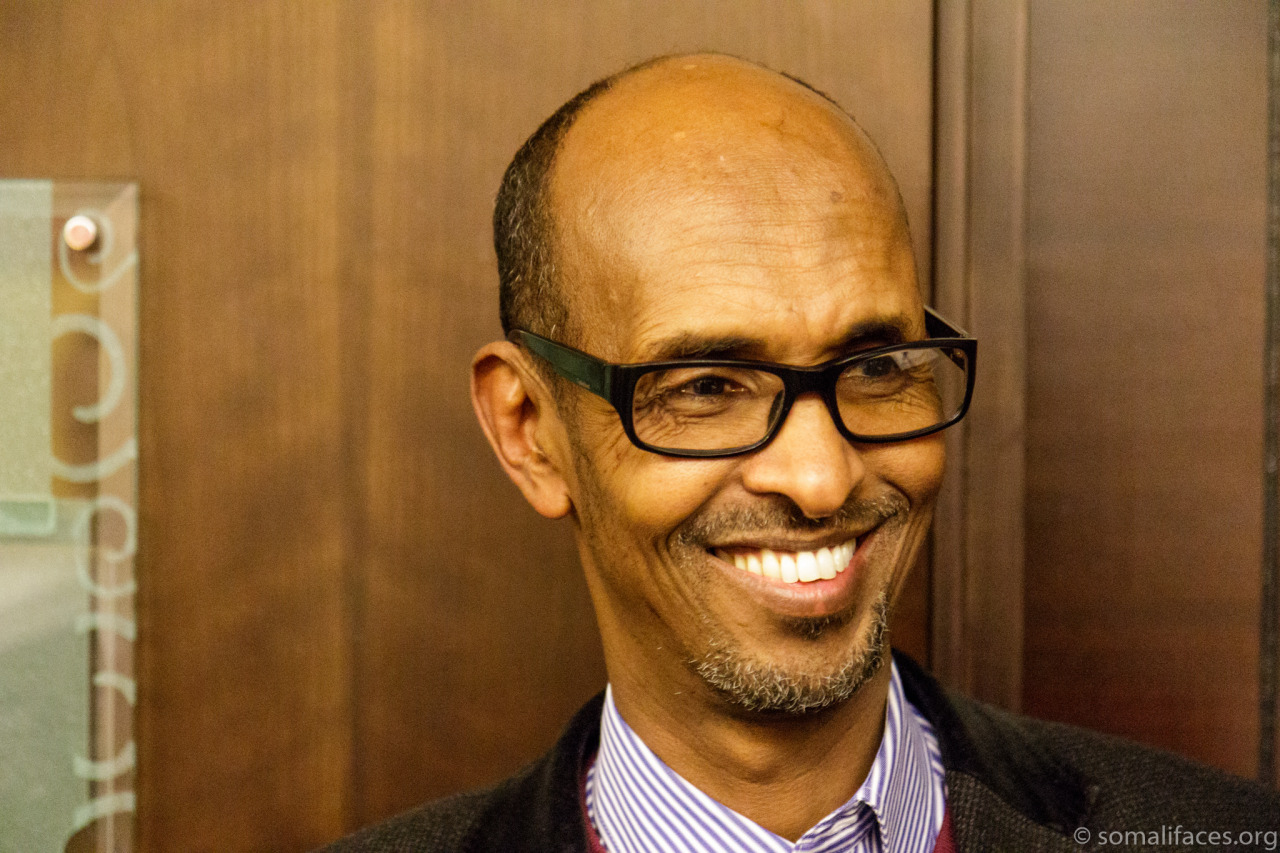
写真はソマリ・フェイス(ドニア&モハメド)より。使用許可済み。
I used to be part of Somalia’s elite special operations force before the civil war. We were Somali taught and thus trained/conducted exercises with the US Army Rangers and Egyptian Special Forces. We used to rotate; sometimes we trained in Somalia, sometimes in Egypt, other times in the United States. After 1991, I switched to IT and left my knowledge and experience in Somali military behind. It was only in 2006 when I saw what foreign forces were doing in Somalia that I changed course, how we do not have any military science specialists and that we have to be trained by so many different countries instead of empowering Somali trainers. I left the world of IT and decided to study military science from scratch, the theoretical aspect for I already am experienced in the practical aspect. I am now currently doing my PhD in Political/Military Science in order to fill the vacuum instead of keeping it open for non-Somalis. I’m aiming to bring back Somali military science, by Somalis and for Somalis.
内戦前、私はソマリアの精鋭特殊作戦部隊の一員でした。ソマリ人の部隊で、米陸軍特殊部隊やエジプト軍特殊部隊の指導のもと、訓練や共同演習を行なっていました。訓練は持ち回りで、ソマリアで行なうことも、エジプトや米国で行うこともありました。1991年(訳注:内戦勃発によりソマリア民主共和国崩壊)後、私はソマリア軍での知識や経験を捨ててIT業に転身しました。外国の軍隊がソマリアでやっていることを知って方向転換したのは、つい2006年のことです。ソマリア軍には軍事科学の専門家は一人もいないし、権限を持ったソマリ人教官のかわりに、雑多な外国人教官の訓練を受けなければならないのです。私はITの世界を離れ、軍事科学を一から、実践面は経験済みなので理論面を学ぼうと決意しました。外国人にオープンなままの状態にせず、空白を埋められるようにと、現在は政治学と軍事科学の博士課程にいます。ソマリ人の手でソマリ人のために、ソマリアに軍事科学を取り戻すことを目指しているのです。
活動家

写真はソマリ・フェイス(ドニア&モハメド)より。使用許可済み。
I was six years old. I went out to play with my friends […] Given that we didn’t have much to play with, we scanned the place for objects that we could play with. […] I found this particular metal object that was beautifully shaped and presented it to my friends […] But it kept getting hot so I chucked it away by throwing it in the air and giving it a nice kick. The minute I kicked it, it blew up. I became unconscious. I opened my eyes at the hospital. I tried to get up but was told that I lost both of my legs. I lost hopes and saw my ambitions dwindling away. I gave up on life. You will never walk again, I told myself. […] After several months in the hospital, the UN visited me and were intrigued by my case so they offered me artificial limbs in order for me to walk again. I […] was suddenly overwhelmed with a new sense of hope. I was the first Somali to have artificial legs fitted. In 1996, I attended an international conference on mine elimination in Switzerland. They kept asking me, what can we do for you, do you want to stay in Switzerland or any other country? I told them to build me a school in my birth city, and they did. It was aptly named after me. I attended my own school and finished high school there. I now have a bachelor degree and campaign for a local organisation that raises awareness for disabled Somali people. You might be physically disabled but that doesn’t mean you’re mentally disabled. If you have an ambition, there are many ways to achieve it.
6歳の時のことです。私は友だちと外へ遊びに行きました。[中略]遊び道具があまりないこともあって、その場で何か遊べるものはないか探しました。[中略]私はこのきれいな形の金属の物体を見つけ、友だちに見せました。[中略]でもだんだん熱くなってきたので捨てようとして、それを空に投げ上げて蹴りとばしました。蹴った瞬間、爆発が起きました。私は気を失いました。目を開けると病院にいました。起き上がろうとしたのですが、私の足は両方とも無い、と告げられました。私は絶望し、将来の夢が消えていくのを感じました。人生をあきらめました。もう歩けないのよ、と自分に言い聞かせました。[中略]数か月入院した後、国連の人が訪ねて来ました。彼らは私の事例に関心を持ち、もう一度歩けるよう義肢を提供してくれました。[中略]突然、希望という新たな感情が私をのみ込みました。義肢をつけるのはソマリ人で私が初めてでした。1996年、私はスイスで開かれた地雷撤廃の国際会議に出席しました。みんな絶えず尋ねてきました。何か援助できることはありますか、スイスや他の国に住みたいですか、と。私が、生まれた町に学校を建ててほしいと言うと、建ててくれました。私の名前にちなんだ学校名になりました。私は自分の学校に通い、そこで高校まで終えました。今私は大学を出て、ソマリ人障害者への意識啓発を行なっている地元組織のため、キャンペーンをしています。身体に障害があるからといって精神にも障害があるとは限りません。夢を持っていれば、それをかなえる道はいくらでもあるのです。
ソマリ・フェイスのサイト上では、もっと多くの感動的な話をお読みいただけます。ツイッターやフェイスブック、インスタグラム上で、このプロジェクトをフォローください。






